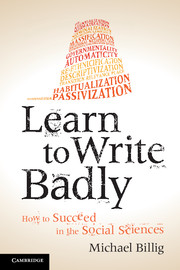Book contents
- Frontmatter
- Contents
- Acknowledgements
- 1 Introduction
- 2 Mass publication and academic life
- 3 Learning to write badly
- 4 Jargon, nouns and acronyms
- 5 Turning people into things
- 6 How to avoid saying who did it
- 7 Some sociological things: governmentality, cosmopolitanization and conversation analysis
- 8 Experimental social psychology: concealing and exaggerating
- 9 Conclusion and recommendations
- References
- Index
9 - Conclusion and recommendations
Published online by Cambridge University Press: 05 June 2013
- Frontmatter
- Contents
- Acknowledgements
- 1 Introduction
- 2 Mass publication and academic life
- 3 Learning to write badly
- 4 Jargon, nouns and acronyms
- 5 Turning people into things
- 6 How to avoid saying who did it
- 7 Some sociological things: governmentality, cosmopolitanization and conversation analysis
- 8 Experimental social psychology: concealing and exaggerating
- 9 Conclusion and recommendations
- References
- Index
Summary
In many academic books, the conclusion provides the place for authors to be optimistic. After chapters of hard travelling, buffeted between theory and doubt, an author can now settle back and tell readers why the journey has been so worthwhile. The author can say that their work promises to improve things, whether it is correcting theoretical misconceptions, striking out on new academic paths or offering to help with the problems of the wider world. I should now be slipping into this sunny upland mood. Yes, I have outlined problems with the ways that academics in the social sciences write. Yes, I have identified some of the linguistic features that lie at the root of these problems. And, yes, here in my conclusion, I will do what is expected: make some recommendations so that we can all move forward to a better future. Yet, I fear that I can recommend until I am fit to burst, but nothing much will change. My recommendations, whatever they are, will just be whispers in the wind.
There may, however, be some readers who are surprised that I could be arriving at the conclusion quite so early. I have claimed to be discussing how social scientists write, but I have only considered a tiny fraction of the social sciences – some linguistics, some sociology, some social psychology, a few theories about globalization and the media and a bit of conversation analysis. Where is the social anthropology? Political science? Social geography? Large-scale empirical sociology? Had I looked at management studies, I would surely have found some choice examples to boost my arguments. Worst of all, I have been focussing on social sciences that are published in English, or have been translated into English. Out there, there is literally a world of social sciences that I have ignored. In my mind, I can also hear some American social scientists complaining that there have been too few Americans here (although they will not put it like that).
- Type
- Chapter
- Information
- Learn to Write BadlyHow to Succeed in the Social Sciences, pp. 206 - 215Publisher: Cambridge University PressPrint publication year: 2013



